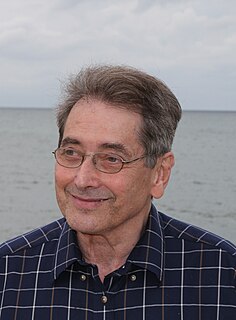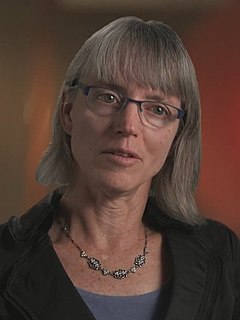Related Research Articles

Cognitive neuroscience is the scientific field that is concerned with the study of the biological processes and aspects that underlie cognition, with a specific focus on the neural connections in the brain which are involved in mental processes. It addresses the questions of how cognitive activities are affected or controlled by neural circuits in the brain. Cognitive neuroscience is a branch of both neuroscience and psychology, overlapping with disciplines such as behavioral neuroscience, cognitive psychology, physiological psychology and affective neuroscience. Cognitive neuroscience relies upon theories in cognitive science coupled with evidence from neurobiology, and computational modeling.
Terrence Joseph Sejnowski is the Francis Crick Professor at the Salk Institute for Biological Studies where he directs the Computational Neurobiology Laboratory and is the director of the Crick-Jacobs center for theoretical and computational biology. He has performed pioneering research in neural networks and computational neuroscience.
Michael Irwin Jordan is an American scientist, professor at the University of California, Berkeley and researcher in machine learning, statistics, and artificial intelligence.

Stephen Grossberg is a cognitive scientist, theoretical and computational psychologist, neuroscientist, mathematician, biomedical engineer, and neuromorphic technologist. He is the Wang Professor of Cognitive and Neural Systems and a Professor Emeritus of Mathematics & Statistics, Psychological & Brain Sciences, and Biomedical Engineering at Boston University.

Nancy Gail Kanwisher FBA is the Ellen Swallow Richards Professor in the Department of Brain and Cognitive Sciences at the Massachusetts Institute of Technology and an investigator at the McGovern Institute for Brain Research. She studies the neural and cognitive mechanisms underlying human visual perception and cognition.

Michael I. Posner is an American psychologist who is a researcher in the field of attention, and the editor of numerous cognitive and neuroscience compilations. He is emeritus professor of psychology at the University of Oregon, and an adjunct professor at the Weill Medical College in New York. A Review of General Psychology survey, published in 2002, ranked Posner as the 56th most cited psychologist of the 20th century.
Mriganka Sur is the Newton Professor of Neuroscience and Director of the Simons Center for the Social Brain at the Massachusetts Institute of Technology. He is also a Visiting Faculty Member in the Department of Computer Science and Engineering at the Indian Institute of Technology Madras and N.R. Narayana Murthy Distinguished Chair in Computational Brain Research at the Centre for Computational Brain Research, IIT Madras. He was on the Life Sciences jury for the Infosys Prize in 2010 and has been serving as Jury Chair from 2018.

Brian A. Wandell is the Isaac and Madeline Stein Family Professor at Stanford University, where he is Director of the Stanford Center for Cognitive and Neurobiological Imaging, and Deputy Director of the Wu Tsai Neuroscience Institute. He was a founding co-editor of the Annual Review of Vision Science.
Emery Neal Brown is an American statistician, neuroscientist, and anesthesiologist. He is the Warren M. Zapol Professor of Anesthesia at Harvard Medical School and at Massachusetts General Hospital (MGH), and a practicing anesthesiologist at MGH. At MIT he is the Edward Hood Taplin Professor of Medical Engineering and professor of computational neuroscience, the Associate Director of the Institute for Medical Engineering and Science, and the Director of the Harvard–MIT Program in Health Sciences and Technology.

The Princeton University Department of Psychology, located in Peretsman-Scully Hall, is an academic department of Princeton University in Princeton, New Jersey. For over a century, the department has been one of the most notable psychology departments in the country. It has been home to psychologists who have made well-known scientific discoveries in the fields of psychology and neuroscience.

Earl Keith Miller is a cognitive neuroscientist whose research focuses on neural mechanisms of cognitive, or executive, control. Earl K. Miller is the Picower Professor of Neuroscience with the Picower Institute for Learning and Memory and the Department of Brain and Cognitive Sciences at Massachusetts Institute of Technology. He is the Chief Scientist and co-founder of SplitSage.
The Troland Research Awards are an annual prize given by the United States National Academy of Sciences to two researchers in recognition of psychological research on the relationship between consciousness and the physical world. The areas where these award funds are to be spent include but are not limited to areas of experimental psychology, the topics of sensation, perception, motivation, emotion, learning, memory, cognition, language, and action. The award preference is given to experimental work with a quantitative approach or experimental research seeking physiological explanations.
Isabel Gauthier is a cognitive neuroscientist currently holding the position of David K. Wilson Professor of Psychology and head of the Object Perception Lab at Vanderbilt University’s Department of Psychology. In 2000, with the support of the James S. McDonnell Foundation, she founded the Perceptual Expertise Network (PEN), which now comprises over ten labs based across North America. In 2006 PEN became part of the NSF-funded Temporal Dynamics of Learning Center (TDLC).
Michael Charles Corballis was a New Zealand and Canadian psychologist and author. He was Emeritus Professor at the Department of Psychology at the University of Auckland. His fields of research were cognitive psychology and cognitive neuroscience, encompassing visual perception, visual imagery, attention, memory, and the evolution of language.
Michael J. Tarr is an American cognitive neuroscientist who currently holds the Kavčić-Moura Professorship in Cognitive and Brain Science. He is a Professor at Carnegie-Mellon University, a recipient of the APA Distinguished Scientific Award for an Early Career Contribution to Psychology from the American Psychological Association in 1997, a recipient of the Troland Award from the National Academy of Sciences in 2003, a Guggenheim Fellow in 2007, and an Elected Fellow of the American Association for the Advancement of Science.

Wendy Suzuki is a Professor of Neuroscience and Psychology at the New York University Center for Neural Science and popular science communicator. She is the author of Healthy Brain, Happy Life: A Personal Program to Activate Your Brain and Do Everything Better.
Adriana Galván is an American psychologist. She currently serves as the Dean of Undergraduate Education and is a professor of psychology at the University of California, Los Angeles. She is the Jeffrey Wenzel Term Chair in Behavioral Neuroscience. She is known for her research in the field of brain development, which focuses on how cognitive and social behaviors change from childhood to adulthood. She also currently holds the position of director of the Galván Laboratory for Developmental Neuroscience at UCLA.
Thomas L. Griffiths is an Australian academic who is the Henry R. Luce Professor of Information Technology, Consciousness, and Culture at Princeton University. He studies human decision-making and its connection to problem-solving methods in computation. His book with Brian Christian, Algorithms to Live By: The Computer Science of Human Decisions, was named one of the "Best Books of 2016" by MIT Technology Review.
Leah H. Somerville is an American psychologist who is a professor at Harvard University. She is a member of the Human Connectome Project. Somerville was awarded the 2022 National Academy of Sciences Troland Research Award.
Richard B. Ivry is an American cognitive neuroscientist. He is a currently Distinguished Professor in the Department of Psychology at the University of California, Berkeley and a founding member of the Helen Wills Neuroscience Institute. Ivry previously served as chair of the university's Department of Psychology and director of its Institute of Cognitive and Brain Sciences. According to the Association for Psychological Science, Ivry's "seminal research program has transformed how we understand perception and action."
References
- ↑ "Michael Joshua Frank, PhD | Parkinson's Disease". www.michaeljfox.org. Retrieved 2021-10-28.
- 1 2 "Michael J. Frank". www.nasonline.org. Retrieved 2021-10-28.
- ↑ "University Professor Michael J. Frank named one of two 2021 Troland Research Award recipients". The Brown Daily Herald. Retrieved 2021-10-28.
- ↑ "Frank, Michael". vivo.brown.edu. Retrieved 2021-10-28.